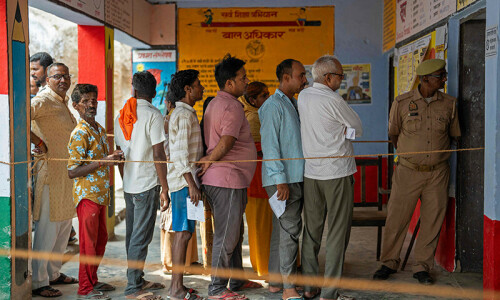RIVERS everywhere come with myths and legends. The deities of the Greek pantheon swore all their oaths upon the mythical Styx that flowed in the underworld. Herodotus summarised the importance of the Nile to the Egyptians saying: “Egypt is the gift of the Nile”. Ancient deity Khnum, lord of water, created humans from the mud of the Nile flood.
In India, Ganga is associated with Shiva’s prowess. Saryu in Ayodhya is the river into which Lord Ram immersed himself after finishing his work on earth. Jamuna is associated with Krishna’s heart-tugging pranks and miracles. The legends have spawned musical overtures. Agra gharana’s Sharafat Husain Khan would sing an evocative composition in Raag Yaman to Shiva: “Darshan deo Shankar Mahadev.” Ram is petitioned persistently for help in Rasoolan Bai’s music. Faiyyaz Khan composed a persuasive praise for Krishna in Raag Paraj. “Manmohan Brij ko rasiya.” That Muslim singers sang memorable compositions to Hindu gods underpins the tragedy being inflicted by India’s ruling zealots who find it inexpedient to hear of how large swathes of both communities have lived culturally intertwined for centuries.
Read: Ahead of key polls, India's ruling BJP revives Hindu-Muslim dispute
Ganga is regarded by orthodox Hindus as the holiest of seven rivers that wash away the sins of their devotees, the others being Narmada, Jamuna, Godavari, Kaveri, the mythical Saraswati and Indus. We’ve known of global and domestic disputes over the sharing of river waters. In India, the politics of rivers is hitched to stirred emotions. Prime Minister Modi is there, for example, communalising the lore of Ganga. Nathuram Godse, hanged for killing Gandhi, wanted his ashes to be immersed in the Indus after the Pakistani river returned to India. It’s not clear how Godse’s ashes were retrieved, if they were, after his secret cremation at a remote riverbank. His family claims to have his urn.
Not every Hindu goes to the Ganga for salvation. Recently, one performed the last rites of a Brahmin relative, a selfless doctor, professor at one of Mumbai’s leading medical colleges who never tired of pro bono work for the needy. But he couldn’t cure his own galloping brain cancer, and passed away in Delhi as one held his hand during the last days at our home. Bhau’s sister took his ashes not to River Ganga but to a water body called Baanganga in Mumbai. It’s a local tradition that believes Lord Ram during his exile travelled there and shot an arrow into the ground from where a sacred spring gushed forth. For the salvation of Bhau’s soul one would want the story to be true. He had smiled when I shared a Bertrand Russell-like quote with him: “O God, if there’s a God. Bless my soul, if there’s a soul,” Inveterate agnosticism is common in South Asia despite the overwhelming prevalence of religion. The idea made Bhau, a believer, sit up and ponder.
In India, the politics of rivers is hitched to stirred emotions.
Leading historian Sudipta Sen has written an absorbing book on the many facets of Ganga, its geological evolution, the numerous mythologies surrounding its origins, and the role the river played in the political conflicts between ancient Indian kingdoms. Ganges: The Many Pasts of an Indian River, published by Yale University in 2019, is a book to read.
On her journey to earth from heaven, Ganga went through several difficult moments. On one occasion, Sen quotes a Puranic legend as saying: “She was lured to the quarters of the great sage Jahnu at the sound of the propitiatory conch, and flooded his ashram. Outraged, Jahnu drank all of Ganga in one mouthful. In great distress, Bhagirath (on whose behalf Ganga had descended on earth) sounded his conch once more, and out came Ganga from Jahnu’s belly and through his knee, much to the old man’s surprise. After she emerged, Ganga paid her obeisance to the mighty sage, addressing him as her father and asking to be called his daughter. Because she came out of Jahnu’s knee, she would henceforth be called Jahnvi.”
While many believe that Ganga’s waters wash away the effects of evil they may have done, Buddha, who lived and taught in the river’s vicinity, frowned on the claim. According to Buddhist lore, Buddha used Ganga as a metaphor to teach the essentials of nirvaṇa: “Just as the Ganga flows, slides, tends towards the east, so too, one who cultivates and makes much of the Noble Eightfold Path flows, slides, tends towards nirvaṇa.”
Mughal emperor Akbar, eclectic in his approach with different religions, had to step in to ban the practice of Hindus jumping into Ganga’s torrent to attain moksha. “Akbar,” says Sen, “sought to intervene in [the] Hindu rituals of sacrifice that he considered inhumane.”
Nehru saw Ganga as a key link to the evolution of Indian history and civilisation. He desired his ashes to be immersed at the Sangam, the confluence of rivers Ganga and Jamuna. Nehru otherwise preferred to keep away from religious rituals to push his prescription for future rulers of secular India. Even his daughter didn’t always follow the advice.
Rajiv Gandhi proposed a vial of water from the Ganga to be taken to the India Festival in France. Pouring Ganga water into the Seine in Paris would symbolise a cultural mingling. A furore erupted in the French press, accusing Indians of seeking to pollute their river. Another problem stalked Gandhi. Rival holy men from different regions the Ganga traversed jostled to provide the water, each claiming theirs was the holiest spot. They were oblivious of the threat the Ganga faced as did other rivers from abuse of nature, from climate change.
As for the French, their furore didn’t question Ganga’s cultural importance. They only wanted Indians, primarily their leaders, to keep their rivers clean, swachh.
The writer is Dawn’s correspondent in Delhi.
Published in Dawn, February 1st, 2022













































